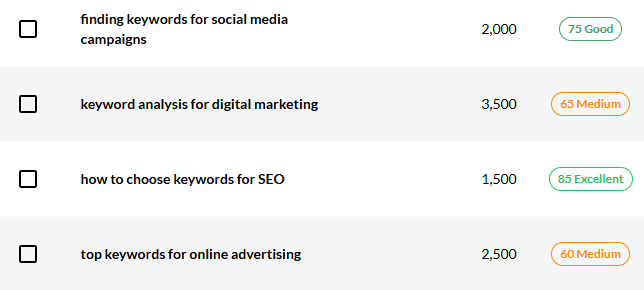How to Choose Keywords for SEO: Your Path to Online Visibility. This one step is the most important one you can take to gather abundant readers
Image by Wealthy Affiliate
Block by Peter Hanley coachhanley.com
Welcome, aspiring online entrepreneurs and content creators! Are you ready to unlock the secret to attracting more visitors to your website and seeing your online efforts flourish? The journey to online success often begins with a single, crucial step: choosing the right keywords for Search Engine Optimization (SEO). Fear not, for this guide will illuminate your path, offering practical advice and a positive outlook on mastering this essential skill.
Understanding the Power of Keywords
Before we dive into the ‘how-to,’ let’s truly appreciate the ‘why.’ Keywords are the bridge connecting what people are searching for online with the valuable content you provide. Think of them as the specific words and phrases potential visitors type into search engines like Google, Bing, or Yahoo. When you strategically incorporate these terms into your website content, you dramatically increase the chances of your site appearing prominently in search results. This, in turn, drives organic traffic – visitors who find your site naturally, without you having to pay for ads. Imagine the ripple effect of genuine interest leading to loyal readers, customers, or clients!
The Foundation: Brainstorming Your Seed Keywords
Every great garden starts with a seed, and your keyword research journey begins with ‘seed keywords.’ These are broad terms that define your niche or the core topics you cover. For instance, if you run a blog about healthy cooking, your seed keywords might include “healthy recipes,” “nutritious meals,” or “diet food.” Don’t overthink this initial stage; the goal is to cast a wide net and generate as many relevant ideas as possible.
Here’s how to get started with your brainstorming:
- Think like your audience: What problems do they have? What questions are they asking? What solutions are they seeking? Put yourself in their shoes.
- Consider your products or services: What do you offer? What unique value do you provide?
- Explore related topics: Use a thesaurus or simply free-associate ideas that spring from your core subject.
This initial exploration is a wonderful opportunity to truly connect with the purpose of your website and the value you bring to the online world.
Diving Deeper: Leveraging Keyword Research Tools
Once you have a solid list of seed keywords, it’s time to supercharge your research with dedicated keyword tools. These powerful platforms take your initial ideas and expand upon them, providing invaluable data that can guide your strategy.
One such remarkable tool, often praised for its ability to reveal hidden gems, is the one provided by Wealthy Affiliate. It’s designed to simplify the complex world of keyword research, making it accessible even for beginners.
Let me show you an example of the kind of insights you can gain:
Imagine discovering a keyword with “great traffic” and “excellent competition possibility.” This means a good number of people are searching for it, and it’s relatively easier to rank for compared to highly saturated terms. This is the sweet spot every online entrepreneur dreams of!

Zeroing In: Focusing on Long-Tail Keywords
Now that you’ve discovered keywords with great potential, the next step is to refine your focus by embracing long-tail keywords. These are longer, more specific phrases—often three or more words—that detail exactly what a searcher is looking for. While they have lower individual search volumes than broad seed keywords, they collectively account for the majority of online searches and, crucially, often have a much higher conversion rate.
Think of the difference:
- Short-Tail: “Healthy recipes” (Broad, high competition, general intent).
- Long-Tail: “Budget-friendly healthy meals for busy parents” (Specific, low competition, clear intent to find recipes now).
Furthermore, focusing on long-tail keywords positions you as an expert in a niche area. When someone types in a very specific question, and your content provides the perfect, detailed answer, you’ve not only earned a visitor but likely a loyal follower. Consequently, you’ll be spending less time fighting for space against massive authority sites and more time serving the exact audience that needs your help.
The Crucial Metric: Analyzing Competition and Traffic
Choosing keywords isn’t just about finding what people search for; it’s also about determining what you can realistically rank for. This is where the competitive analysis data from your keyword tool becomes your best friend.
First and foremost, look for keywords that strike that ideal balance: High Traffic, Low Competition.
- Traffic/Avg. Searches: This number tells you how many times, on average, a keyword is searched per month. Naturally, you want a figure that justifies your writing effort.
- Competition: This metric indicates how difficult it will be to rank on the first page of search results for that keyword. The lower the number, the better! The example we saw earlier—”Excellent Competition Possibility” (35 out of 100)—is a green light that signals a wonderful opportunity to shine.
Moreover, when analyzing competition, you can check the first page of search results (the SERPs) yourself. Are the top results from massive, well-known brands, or are there smaller, independent blogs? If you see independent sites, that’s a positive indicator that you too can break into the top rankings. Therefore, always aim for keywords where you can confidently produce content that is better and more comprehensive than what is currently ranking.
Intent is Everything: Matching Keywords to the Searcher’s Goal
A common mistake is selecting a keyword simply because the traffic is high. However, the true measure of a good keyword lies in the search intent—what does the person actually want to achieve by typing that phrase?
There are generally four types of search intent:
- Informational: The user wants to learn something (“How to choose keywords”). Use this for blog posts and guides.
- Navigational: The user wants to find a specific website (“Wealthy Affiliate login“). Use this for internal links or branded content.
- Commercial Investigation: The user is researching a purchase (“Best SEO keyword tool reviews“). Perfect for comparison articles and reviews.
- Transactional: The user is ready to buy (“Buy keyword research software now“). Use this on product and sales pages.
Ultimately, by matching your content type to the user’s intent, you create a seamless, positive experience. A person searching for “how-to” doesn’t want to see a sales page, and someone ready to buy doesn’t want a long history lesson. Consequently, focusing on intent ensures that every visitor landing on your site is there for the exact content you offer, dramatically increasing the chance of a positive action.
Bringing It All Together: Your Next Steps to SEO Success
You now possess the foundational knowledge needed to select high-value keywords: you know how to brainstorm, how to use tools to find low-competition gems, how to leverage long-tail phrases, and how to match your content to search intent.
In summary, mastering keyword research is not a one-time task; it’s an empowering, continuous process that connects your passion with your audience’s needs. It is the engine that drives sustainable, organic growth for your website.
And this is where having the right resources becomes a genuine game-changer. You need an easy-to-use platform that integrates powerful keyword research with comprehensive training on content creation and SEO.
This brings us back to the incredible opportunity offered by Wealthy Affiliate. Their platform simplifies this entire process, providing the exact kind of data and training that leads to finding keywords with “Great Traffic and Excellent Competition Possibility”—keywords that will move the needle for your business. Therefore, if you are serious about building a thriving online business based on solid SEO principles, having tools that reveal these golden nuggets is non-negotiable.
Don’t let guesswork hold you back any longer. Start transforming your keyword strategy today and unlock the limitless potential of your website.
Ready to stop guessing and start targeting the keywords that will bring you consistent, high-quality traffic? Discover the exact keyword tool shown above and begin building your profitable online business with Wealthy Affiliate!

Authors comment.
You will notice that I chose a keyword using the Wealthy Affiliate word generator called Jaaxy, free with every service. This had traffic 1500 searches a month but low competition ranking “Excellent”. Furthermore I made this into a longtail word to really connect with readers intent..
To add to this I used the image generator and log maker to brighten the page. Writing and research was assisted by Google Gemini.
